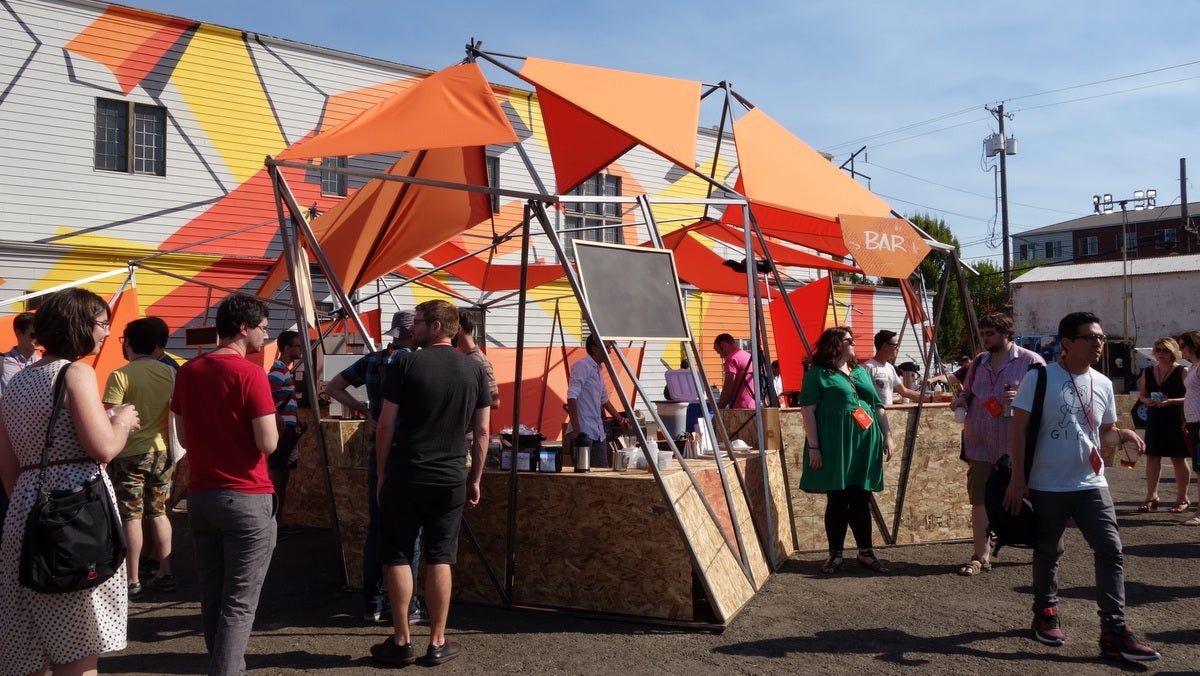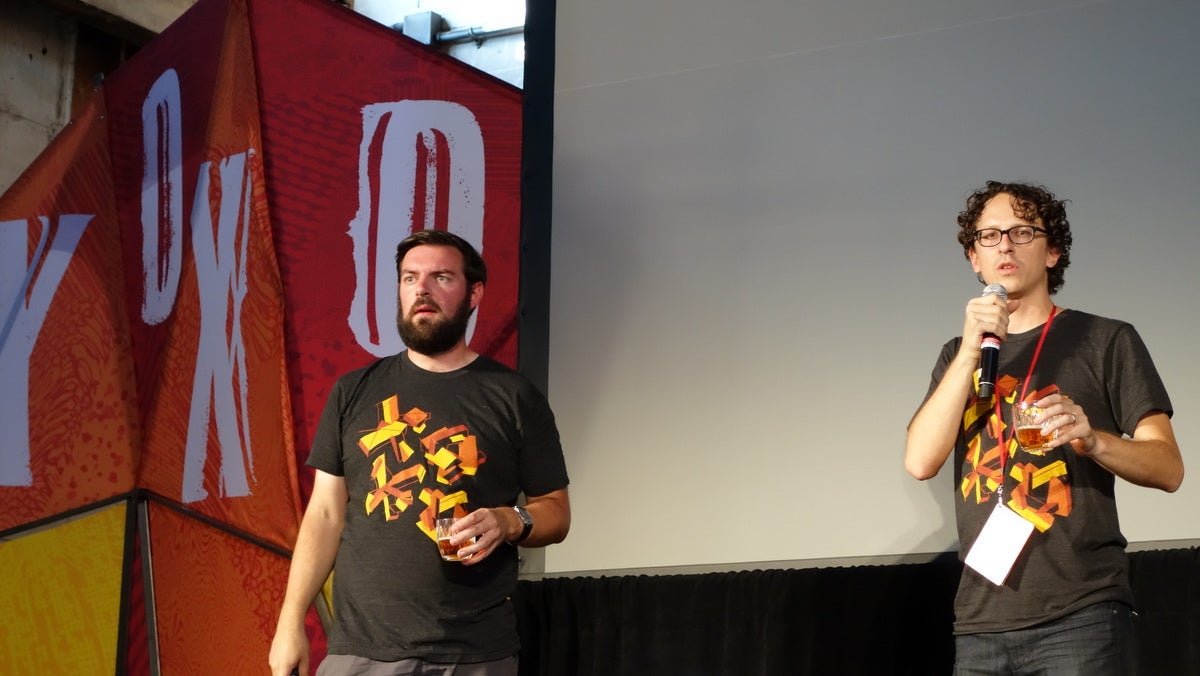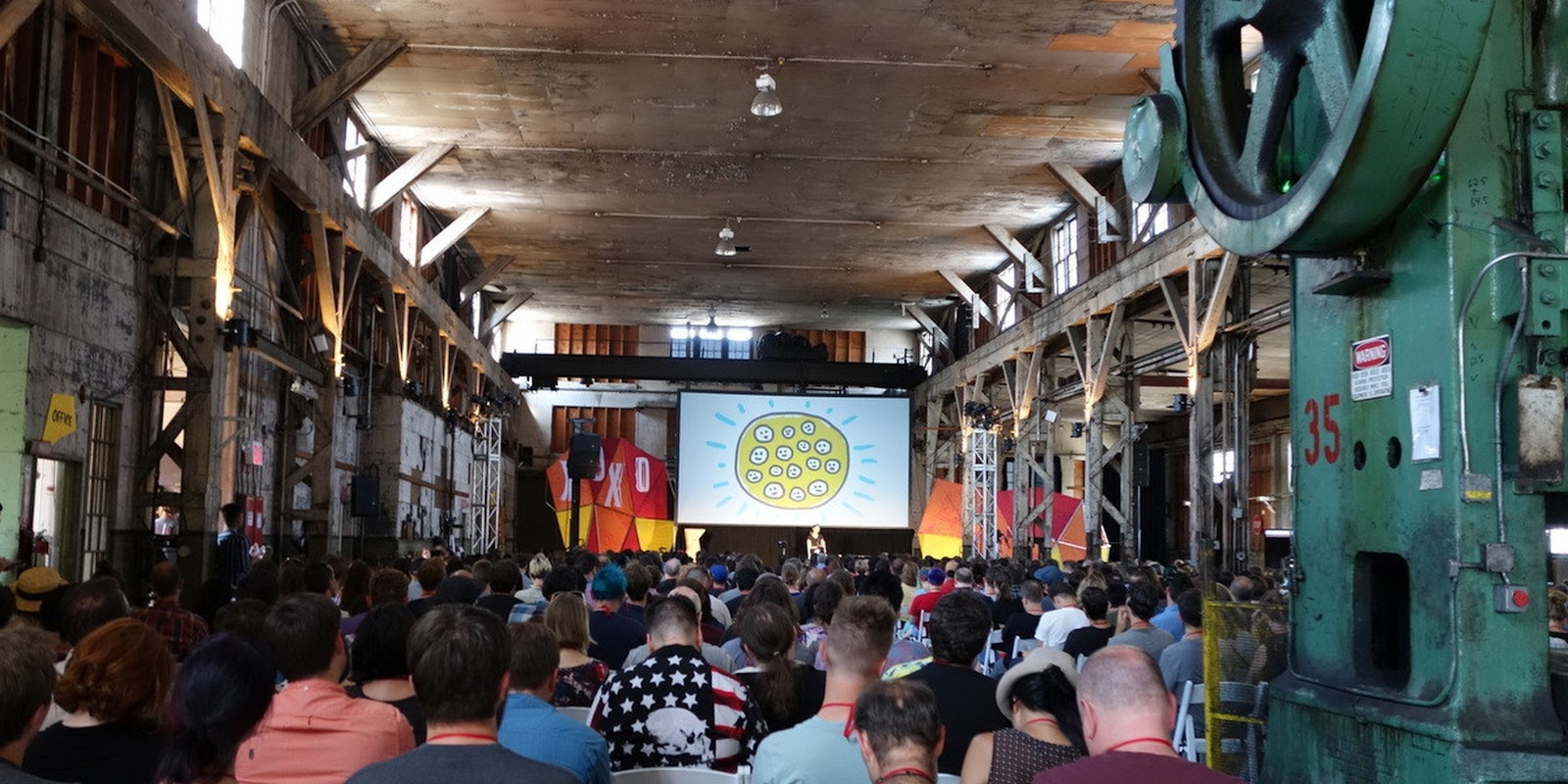Two days after getting back home from a funeral, I dragged myself to XOXO Fest. I wasn’t looking forward to faking it, pretending to care about assorted tech industry bullshit for as long as it took to switch into professional autopilot survival mode.
Less than a week earlier, an old friend took her own life in a violent end that my brain can’t quite make real. My friend, let’s call her Julie, had me thinking about a lot of things differently. It was like the tracing paper on top of my routine had shifted slightly; everything was a little off and I could see both sets of lines.
As it turned out, a lot of other people were seeing both sets too. I was in good company.
I’m not sure @xoxo translates well to Twitter, but I was glad to see an event where confronting mortality & death was a recurring theme.
— Anil Dash (@anildash) September 16, 2014
Is technology the opposite of death? With the right programming, could we live online forever? If stuff like Facebook makes us so goddamn unhappy, why can’t we stop using it? And, maybe most importantly, how can we make things better?
XOXO isn’t a normal tech conference, so this won’t be a normal story about one. Arguably, it isn’t really a conference so much as a looser sort of coming together, a migration of sorts, and it isn’t really about tech. We talked about privilege and phenomenology, Arduinos and Super Nintendo controllers with cat ears, life, death and what to make of this weird stuff in between. My brain whirred and purred.
Even now, trying to cage the sprawl of my thoughts from my weekend into something coherent feels like chasing after 100 bouncy balls simultaneously dropped from low flying drones, an exercise that actually wouldn’t be particularly out of place at XOXO, assuming there were LED lights in the bouncy balls.
But what is it?
The event, held in suitably quirky, hoppy Portland, Ore., is in its third year. If you ask its founders, there’s no guarantee that there will even be another one. Like most things at XOXO, the event itself exists not as a means to an end (nor as the heavily sponsored offshoot of some brand), but as a means unto itself. Make no mistake: XOXO is about the process, the unspooling of thought and concept—the end result, if there is one, is something of a happy accident. Themes of failure, vulnerability, and process(ing) ran throughout the talks and conversations. Every taboo of Silicon Valley culture ricocheted around the Redd, XOXO’s fittingly raw industrial space.
XOXO is a proof of concept. Yank enough Important People With Cool Ideas totally out of context (a cap of 1,000 this year selected by a diversity-minded application process and a lottery system), get them far enough away from the industry’s thriving epicenter of bullshit and bad habits, and they’ll just be regular people with cool ideas again. At XOXO there are no pitches, no VC riches at stake, no shitty journalists rewriting press releases… just a remarkably relaxed market of free-flowing ideas—the kind of thing Portland is best at, really, given its open-source enthusiasm and collaborative spirit.

All of it is the sort of thing ever-myopic Silicon Valley breeds out of its innovators as they move up technology’s ruthless, all-carnivore foodchain. Not that XOXO doesn’t have its share of apex predators turned out of context herbivores. Top minds from various corners of the industry came to steep in the event’s intellectual, playful juices. Among them: Matt Cutts, Google’s SEO demigod, who tweeted out for a decent place to eat. 4chan founder Christopher “moot” Poole milled around. Stewart Butterfield, the founder of Flickr and more recently Slack, waited in line to collect the proper size heather grey T-shirt.
XOXO felt like some kind of IRL Secret, one where there were no dumb ideas or assholes, and you’d only figure out who exactly you’d just spent an hour talking to after scrolling to the very end of the thread—if you even felt like it.
Surprised by the unpretentiousness, I found myself emphasizing other aspects of my interests and character that professional superlatives don’t quite capture. I’m a newish Portlander who likes poetry and big ideas, someone who spent years parked at the intersection of philosophy and neural science, an eager early adopter and an activist. Normally I’d just be pigeonholed as the writer for so-and-so. Who you are becomes irrelevant—what do you think? What do you want to build? The more contemplative, core parts bubble up, bringing questions with them.
Recounting my XOXO experience might be about as interesting as describing a dream in depth, so maybe it’s not a coincidence that the event’s cofounder Andy Baio calls his creation a “consensual hallucination.” The event would probably mix as well with psychotropics as it did with Oregon’s IPAs.
XX, XO
As a woman, I felt much more at ease than I do at nearly all of the events I attend. Part of that is probably that Portland’s tech scene has a far less aggressively skeezy vibe (usually) than events I attend regularly in Vegas or San Francisco. But plenty of credit is due to the organizers, who seemed genuinely thrilled to have women comprise 40 percent of attendees this year. The event could definitely stand to strive for more racial diversity to further its uncharacteristically noble mission, but I don’t doubt that further efforts for diversity are under discussion.
Women were in attendance and on stage too. Among them, Gina Trapani, the well-loved founder of Lifehacker, currently working on ThinkUp with Anil Dash; Erin McKean, founder of Wordnik and the former editor of the Oxford New American Dictionary; Anita Sarkeesian, founder of the vlogs Feminist Frequency and Tropes vs. Women—and currently a target at the swirling center of the misogynistic clusterfuck known as “Gamergate.”
One night, at the tabletop gaming event of all things, an attendee got booted out for “being creepy.” Later, in line for coffee at XOXO’s warehouse HQ, I heard the full story: Some guy insisted on being the “village rapist” in a game of Werewolf, a classic roleplaying game. He was reported by another male attendee and had his XOXO attendee badge yanked moments later. Earlier that day, Sarkeesian had given her powerful personal testimonial of online harassment. It was an ugly torrent of hate—one that seemed to genuinely shake male attendees, more than a few of whom who brought it up as the most powerful moment from the conference.
“One of the most radical things you can do is to actually believe women when they tell you about their experiences.” @femfreq #xoxofest
— David Gallagher (@davidfg) September 13, 2014
Watching @anitasarkeesian at XOXO and feeling terribly frustrated and amazed and hopeful all at the same time.
— Hank Green (@hankgreen) September 13, 2014
Taking it in
Later, I saw this firsthand as an attendee I’d befriended over way too many matches of Speed Chess processed the stuff he’d taken to heart over a beer with me. It’s noteworthy that at a normal event I’d be extremely wary of sitting down for a beer with a guy I didn’t know to begin with, much less willing to share a cab home like we’d done the night before, brows knit in a troubled chat about Gamergate. Having identified as female for quite a while now, the accounts of vengeful sexism didn’t shake me in quite the same way (they do that every day!), but watching that sink in for him as he actively listened to my own unsavory stories was an indescribably powerful experience.
After digesting some of the rawness, we launched into a conversation about human nature, anonymity, Google X, and Internet ethics. I stood on my toes to catch the bartender’s eye for another round, painfully aware of how long it took and how many guys cut in line in front of me. When I returned to our table, his friend joined us with a young daughter in tow. She was wary of strangers, hesitant to say hello, her hands folding over her mouth. All weekend, things kept coming back around like this, closing circles with quiet poignance. X, O.

XOXO Fest organizers Andy McMillan (left) and Andy Baio
Closing the circle
Paul Ford gave the final talk. I’d followed his Internet handle, @ftrain, and his floppy disc avatar for a while. On stage, he explained that in Brookyn, he used to watch the F slip by his window. It was a chilling coincidence then when he paused to quietly confide in the audience that years before, he’d considered stepping in front of a train, stepping out of his own life. Instead, he went home and told his wife. He built things online, took the solace he could in technology, in the process and the processing, in building better tools to remember it all—to remember things that weren’t even his to remember, like what his dad might have listened to on the radio.
My friend Julie was killed by a train, but not that train. Before I knew anything about technology, I took the F train to work every morning. I always liked how it flickered into the dark subway tunnels and back out again over the East River, playing chicken with the light.
In XOXO’s final moments, two tearful Andys (founders McMillan and Baio) took the stage to dedicate the whole event, all of those hacks and dreams and feelings, to their friend, Chloe Weil. On July 9, Baio’s blog reads “For the second time in 18 months, I’ve lost a friend to depression—a unique, young talent with their greatest years ahead of them.” Her Instagram avatar is a pixelated cat wearing sunglasses. In pictures, she looks funny and young and smart, not lost. “Chloe Weil tasted words.”
The weekend felt like moving through a word cloud, ideas came back around and around; the words got bigger and more colorful. My new friend pointed out my tattoo: “the words are maps,” down my arm.
The Andys clinked together two short glasses of bourbon in a brokenhearted toast. My heart swelled for a cat wearing sunglasses. Light filtered through the window.
Photos by Taylor Hatmaker


